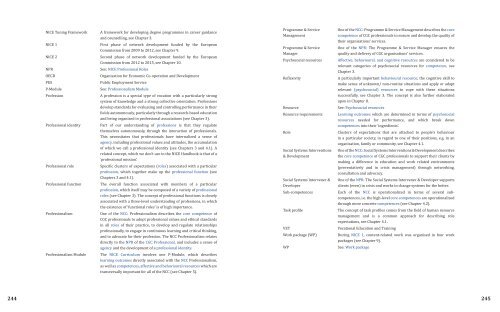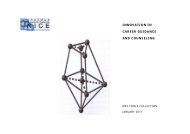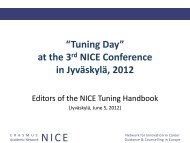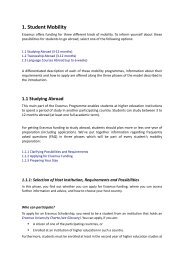NICE HANDBOOK â Academic training of Career ... - Nice-network.eu
NICE HANDBOOK â Academic training of Career ... - Nice-network.eu
NICE HANDBOOK â Academic training of Career ... - Nice-network.eu
You also want an ePaper? Increase the reach of your titles
YUMPU automatically turns print PDFs into web optimized ePapers that Google loves.
<strong>NICE</strong> Tuning Framework<strong>NICE</strong> 1<strong>NICE</strong> 2NPROECDPESP-ModulePr<strong>of</strong>essionPr<strong>of</strong>essional identityPr<strong>of</strong>essional rolePr<strong>of</strong>essional functionPr<strong>of</strong>essionalismA framework for developing degree programmes in career guidanceand counselling, see Chapter 3.First phase <strong>of</strong> <strong>network</strong> development funded by the EuropeanCommission from 2009 to 2012, see Chapter 9.Second phase <strong>of</strong> <strong>network</strong> development funded by the EuropeanCommission from 2012 to 2015, see Chapter 10.See: <strong>NICE</strong> Pr<strong>of</strong>essional RolesOrganisation for Economic Co-operation and DevelopmentPublic Employment ServiceSee: Pr<strong>of</strong>essionalism ModuleA pr<strong>of</strong>ession is a special type <strong>of</strong> vocation with a particularly strongsystem <strong>of</strong> knowledge and a strong collective orientation. Pr<strong>of</strong>essionsdevelop standards for evaluating and controlling performance in theirfields autonomously, particularly through a research-based educationand being organized in pr<strong>of</strong>essional associations (see Chapter 3).Part <strong>of</strong> our understanding <strong>of</strong> pr<strong>of</strong>essions is that they regulatethemselves autonomously, through the interaction <strong>of</strong> pr<strong>of</strong>essionals.This necessitates that pr<strong>of</strong>essionals have internalized a sense <strong>of</strong>agency, including pr<strong>of</strong>essional values and attitudes, the accumulation<strong>of</strong> which we call a pr<strong>of</strong>essional identity (see Chapters 3 and 4.1). Arelated concept, which we don’t use in the <strong>NICE</strong> Handbook is that <strong>of</strong> a‘pr<strong>of</strong>essional mission’.Specific clusters <strong>of</strong> expectations (roles) associated with a particularpr<strong>of</strong>ession, which together make up the pr<strong>of</strong>essional function (seeChapters 3 and 4.1).The overall function associated with members <strong>of</strong> a particularpr<strong>of</strong>ession, which itself may be composed <strong>of</strong> a variety <strong>of</strong> pr<strong>of</strong>essionalroles (see Chapter 3). The concept <strong>of</strong> pr<strong>of</strong>essional functions is closelyassociated with a three-level understanding <strong>of</strong> pr<strong>of</strong>essions, in whichthe existence <strong>of</strong> ‘functional roles’ is <strong>of</strong> high importance.One <strong>of</strong> the NCC: Pr<strong>of</strong>essionalism describes the core competence <strong>of</strong>CGC pr<strong>of</strong>essionals to adopt pr<strong>of</strong>essional values and ethical standardsin all roles <strong>of</strong> their practice, to develop and regulate relationshipspr<strong>of</strong>essionally, to engage in continuous learning and critical thinking,and to advocate for their pr<strong>of</strong>ession. The NCC Pr<strong>of</strong>essionalism relatesdirectly to the NPR <strong>of</strong> the CGC Pr<strong>of</strong>essional, and includes a sense <strong>of</strong>agency and the development <strong>of</strong> a pr<strong>of</strong>essional identity.The <strong>NICE</strong> Curriculum involves one P-Module, which describeslearning outcomes directly associated with the NCC Pr<strong>of</strong>essionalism,as well as competences, affective and behavioural resources which aretransversally important for all <strong>of</strong> the NCC (see Chapter 5).Programme & ServiceManagementProgramme & ServiceManagerPsychosocial resourcesReflexivityResourceResource requirementsRoleSocial Systems Interventions& DevelopmentSocial Systems Intervener &DeveloperSub-competencesTask pr<strong>of</strong>ileVETWork package (WP)WPOne <strong>of</strong> the NCC: Programme & Service Management describes the corecompetence <strong>of</strong> CGC pr<strong>of</strong>essionals to ensure and develop the quality <strong>of</strong>their organisations’ services.One <strong>of</strong> the NPR: The Programme & Service Manager ensures thequality and delivery <strong>of</strong> CGC organisations’ services.Affective, behavioural, and cognitive resources are considered to berelevant categories <strong>of</strong> psychosocial resources for competence, seeChapter 3.A particularly important behavioural resource; the cognitive skill tomake sense <strong>of</strong> unknown/ non-routine situations and apply or adaptrelevant (psychosocial) resources to cope with these situationssuccessfully, see Chapter 3. The concept is also further elaboratedupon in Chapter 8.See: Psychosocial resourcesLearning outcomes which are determined in terms <strong>of</strong> psychosocialresources needed for performance, and which break downcompetences into their ‘ingredients’.Clusters <strong>of</strong> expectations that are attached to people’s behaviourin a particular society, in regard to one <strong>of</strong> their positions, e.g. in anorganization, family or community, see Chapter 4.1.One <strong>of</strong> the NCC: Social Systems Interventions & Development describesthe core competence <strong>of</strong> CGC pr<strong>of</strong>essionals to support their clients bymaking a difference in education and work related environments(preventatively and in crisis management) through <strong>network</strong>ing,consultation and advocacy.One <strong>of</strong> the NPR: The Social Systems Intervener & Developer supportsclients (even) in crisis and works to change systems for the better.Each <strong>of</strong> the NCC is operationalized in terms <strong>of</strong> several subcompetences,i.e. the high-level core competences are operationalizedthrough more concrete competences (see Chapter 4.2).The concept <strong>of</strong> task pr<strong>of</strong>iles comes from the field <strong>of</strong> human resourcemanagement and is a common approach for describing roleexpectations, see Chapter 4.1.Vocational Education and TrainingDuring <strong>NICE</strong> 1, content-related work was organised in four workpackages (see Chapter 9).See: Work packagePr<strong>of</strong>essionalism Module244 245






